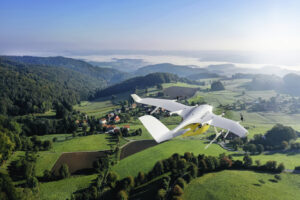Jan 16, 2024

Wingcopter and the Frankfurt University of Applied Sciences (Frankfurt UAS) recently launched the Drohnen-Lastenrad-Express-Belieferung (Drone-Cargo Bike Express Delivery) project.
The pilot project offers residents of remote districts the opportunity to have groceries and consumer goods delivered to their homes quickly and emission-free by Wingcopter delivery drone and cargo bike. The drone deliveries are intended to sustainably improve local supply in the region.
“Even in a well-developed country like Germany, we know the challenge that rural communities have been facing as a consequence of the accelerated closure of small local shops and supermarkets in the past ten to twenty years,” Thomas Dreiling, Wingcopter’s Communications Manager, said. “We have therefore had the idea of offering such a service to remote communities in Germany for quite some time. As a first step, we identified regions and cities close to our headquarters that suffer from such a shortage of local supply and then teamed up with Frankfurt University of Applied Sciences to apply for a grant from the German Federal Ministry of Digital and Transport.”
Once the funds were granted, Wingcopter started to apply for flight permits with the local authorities and prepared operations on the ground, leveraging the experience from everyday operations in Malawi and other parts of the world.
“Offering a drone-based delivery service for everyday goods can still significantly improve quality of life for many people in Germany as well, especially for citizens with limited mobility such as the elderly or those without their own cars,” Dreiling added.
Supporting supply chain
Wingcopter is convinced that delivery drones can add a critical element to supply chains, especially in remote areas – not only in regions with limited infrastructure but also in developed countries, such as Germany.
In Odenwald, for example, the location of their current project, the smaller villages and communities outside the medium-sized centres lack their own local supply, and the supermarkets in the bigger towns don’t offer ground-based delivery to the countryside.
As a consequence, citizens quite often have to travel by car for half an hour to get to the nearest supermarket.
“We consider the delivery of e-commerce products by drone a big opportunity in the future, especially on the last mile in rural areas,” Dreiling explained.
Sustainable solutions have become a key element in many companies’ strategies going forward. All-electric drones can offset a lot of emissions and reduce traffic on the roads, especially in remote areas where a fuel-based ground vehicle would be sent to deliver small but urgently needed supplies.
“Since we always try to think one step ahead, we are currently developing a green hydrogen-based propulsion system together with ZAL Center of Applied Aeronautical Research GmbH that would enable our drone to fly even longer distances without any emissions,” Dreiling highlighted.
The post Last mile deliveries by drone appeared first on AIR CARGO WEEK.
Go to Source
Author: Edward Hardy




